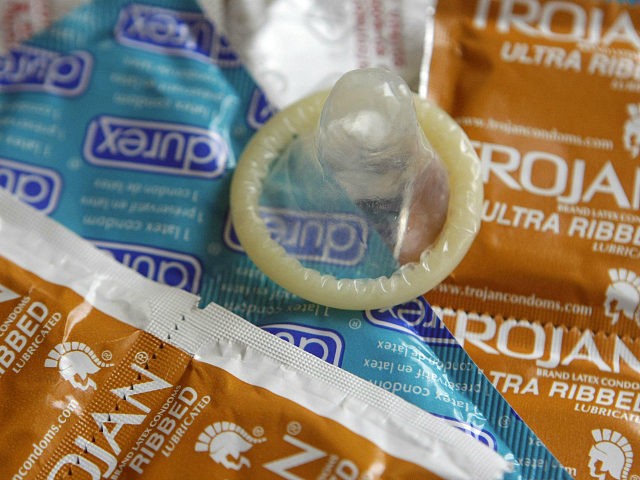A new Vermont education law, the first in the nation, requires middle and high schools to offer free condoms to students.
👏👏👏Good news for Vermont! https://t.co/ka0a1Rw9cE
— Planned Parenthood of Northern New England (@ppnnehealth) November 11, 2021
Guidance released by the Vermont Agency of Education cites the new measure, which was signed into law in 2020 by Gov. Phil Scott (R), and its stated intention of preventing pregnancy and sexually transmitted infections:
In order to prevent or reduce unintended pregnancies and sexually transmitted diseases, each school district shall make condoms available to all students in its secondary schools, free of charge. School district administrative teams, in consultation with school district nursing staff, shall determine the best manner in which to make condoms available to students. At a minimum, condoms shall be placed in locations that are safe and readily accessible to students, including the school nurse’s office.
The guidance also states, with regard to sex education:
Inclusive, developmentally appropriate comprehensive sexual health education should be incorporated into elementary and secondary health education. SU/SD/schools should ensure health curriculum, and in particular sexual health education, is coherent and coordinated across buildings and grade levels. Condom availability is a key element of comprehensive sexual health education.
“Condoms should be available in locations that are safe and readily accessible for students, without barriers to obtaining condoms or stigma surrounding access,” the guidance continues, adding the condoms should be able to be obtained at the “health office or classroom, athletic trainer’s office, guidance office or other locations students can comfortably access.”
“Information about proper condom use that represents all students, inclusive of gender identity, sexuality, and ethnicity, should also be available,” the guidance states as well.
The legislation came about after results of a 2019 Vermont Youth Risk Behavior Survey was reported, and showed 40 percent of high schoolers are sexually active, but only half indicated using condoms.
Mary Beerworth, executive director of the Vermont Right to Life Committee, said her group is worried the new law is “a subtle endorsement of early sexual activity,” News10.com reported.
“Parents have no idea that bowls of condoms are going to be placed potentially in the nurse’s office and potentially in the bathroom,” she said.
The condoms are being provided by Planned Parenthood.
Lucy Leriche, vice president of Vermont Public Affairs at Planned Parenthood of Northern New England,” said that “in some cases, we had students who advocated to school boards to create a condom availability policy.”
Hooking up? Here are 12 ways to do it right: https://t.co/BPivVULjNy via @TeenVogue
— Planned Parenthood (@PPFA) November 2, 2019
In her testimony before the Vermont Senate Health & Welfare committee regarding the legislation, Leriche stated her Planned Parenthood organization is “the largest reproductive health care and sexuality education provider in northern New England.”
“Our mission is to provide, promote, and protect access to reproductive health care and sexuality education so that all people can make voluntary choices about their reproductive and sexual health,” she said, adding Planned Parenthood’s “Peer Education Program” allows high school students to “lead the annual Vermont Youth Sex Education summit” to “receive leadership training to expand access to sex education statewide and to increase young people’s knowledge of and access to sexual and reproductive health care.”
According to a report at Vermont Public Radio (VPR) in October, Leriche also said:
With abortion in the spotlight at the U.S. Supreme Court, there was a real desire to make sure that, yes, we should be protecting abortion rights. But, we should also make sure that the full spectrum of reproductive care is supported in state policy.
Abortion is health care — and it needs to be included in conversations about sex and sexual health at home and in the classroom: https://t.co/yms881XPQt via @rewire_news
— Planned Parenthood (@PPFA) October 2, 2019
In 2019, former Planned Parenthood family planning educator Monica Cline told Breitbart News she left the abortion business after she learned its main goal was to develop a continued stream of abortions.
“They justify their actions by stating that they are simply answering the questions of curious youth,” explained Cline, who ultimately founded her own website and organization called It Takes a Family.
Now, she urges parents to “reclaim parenthood” and provides them with resources needed to build up trust in family bonds.
Cline said when asked if there is anything that frightens Planned Parenthood, she responds, “Parents!”
“Planned Parenthood is afraid of educated, engaged, protective and confident parents,” she asserted:
Remember, they think that parents are a barrier to service. They depend on the public submitting to them as the “sex experts” but they have little to offer with their low standards and bullying tactics against parents who want to protect their children from disease, unplanned pregnancies and compromised emotional health.
NBC5 News reported that Amanda Spencer, a counselor at Winooski Middle School, said about the new law that middle schools and high schools “have a responsibility to encourage their students, their young people, to advocate for themselves, to ask questions, to clarify confusion.”
But Sharon Toborg, policy analyst for the Vermont Right to Life Committee, told VPR:
The reality is that when you encourage sexual activity among young kids, and treat it as normal and acceptable for 12-year-olds to be engaging in sexual activity, you are creating an atmosphere that will lead to more sexual activity and more unintended pregnancies.
Toborg added the new law will block schools from allowing parents to opt out when even 12-year-olds say they are seeking condoms.
Cline told Breitbart News in 2019 the job of teaching children about sex belongs to parents, not Planned Parenthood.
“We can stop Planned Parenthood from sexualizing our children by having parents lead the conversation at home, in the community and through legislation,” she said. “It’s time we reject Planned Parenthood’s practice of eliminating the parent from their children’s health care and education.”

COMMENTS
Please let us know if you're having issues with commenting.